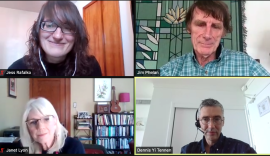The Role of the Humanities in Addressing Vaccine Hesitancy
When
Where
COVID-19 remains an ongoing public health threat in the United States, despite widespread availability of effective vaccines. The anti-vaccination movement has been characterized as a disingenuous partisan ploy underwritten by far-right politicians and media outlets, but those who refuse vaccination are not all willfully ignorant or dangerously misinformed—that is, the causes of vaccine hesitancy are multifarious and complex. Beginning from the premise that the humanities are uniquely equipped to confront such complicated social, political, and ethical matters, this webinar will explore the causes of, and potential solutions to, vaccine hesitancy from a variety of disciplinary (and interdisciplinary) perspectives.
Panelists:
- James Phelan, Distinguished University Professor of English and Director of Project Narrative, The Ohio State University. Phelan has devoted his research to thinking through the consequences of conceiving of narrative as rhetoric, an effort that has recently taken him to the emerging subfield of narrative medicine. Among his many books are Reading People, Reading Plots; Narrative as Rhetoric; Living to Tell About It; Experiencing Fiction; Reading the American Novel, 1920-2010; and Somebody Telling Somebody Else. Since 1992, Phelan has been the editor of Narrative, the journal of the International Society for the Study of Narrative. In 2021, the Society named him the recipient of its Wayne C. Booth Lifetime Achievement Award.
- Dennis Yi Tenen, Associate Professor of English and Comparative Literature, Columbia University. Tenen’s research and teaching focus on various topics including literary theory, the sociology of literature, media history, and computation narratology. The author of Plain Text: The Poetics of Computation (Stanford University Press, 2017), he is currently writing a book on the creative limits of artificial intelligence. Tenen serves as Project Lead for “Increasing COVID-19 Vaccine Confidence,” an initiative funded by a grant from Columbia World Projects.
- Janet Lyon, Director of Graduate Studies and Associate Professor of English and Women’s, Gender, and Sexuality Studies, Penn State.Lyon is an affiliate of the Rock Ethics Institute and director of Penn State's Disability Studies Minor. She publishes on modernism and disability, focusing especially on the emergence of “disability” as a category in the modernist period. Lyon is a former registered nurse.
Moderator:
Jess Rafalko, Graduate Student, Department of English, Penn State
